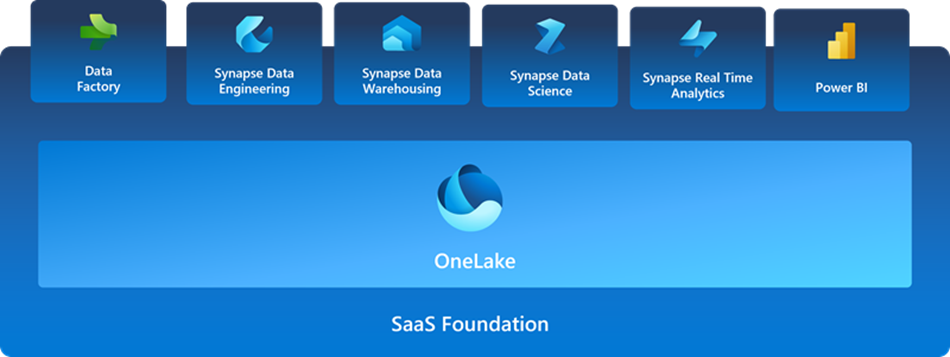Microsoft Fabric is an integrated platform that simplifies data management and application development. With high scalability and advanced security, organizations can adapt their infrastructure to growing needs and protect sensitive information.
What is Fabric, and how can it help your business?
Microsoft Fabric is a comprehensive SaaS (Software as a Service) platform for data, analytics, and AI that simplifies the integration, management, and analysis of corporate data. It combines various tools and services from Microsoft, including Azure Data Factory and Azure Synapse Analytics, for real-time analysis. In short, Microsoft Fabric streamlines how companies manage data across different departments for better decision-making.
Microsoft Fabric streamlines the entire data lifecycle, combining several data-related functions into a single environment, reducing the need for multiple tools, simplifying IT infrastructure, and lowering overhead costs.

The Shared SaaS Foundation for Microsoft Fabric
Key Features of Fabric
- Simplified data management: Fabric is an all-in-one solution that simplifies the entire data management process. Everything takes place in a single environment, reducing the need for multiple tools and simplifying IT infrastructure.
- Data analysis: Fabric can handle large volumes of data and transform them into useful information. Tools like Spark help data engineers manage large datasets.
- Databases: Fabric offers high-performance, scalable SQL-based analytics. It optimizes resource usage by separating computation from storage, improving query performance, and enabling flexible scaling of resources as needed without impacting data availability.
- Real-time analysis: The platform can handle real-time data streams, making it suitable for applications requiring immediate insights from data flows. Fabric manages all types of data formats and sources.
- Business intelligence: Fabric's integration with Power BI provides tools for visualization and dashboards that turn data into actionable insights for decision-makers. Power BI's user-friendly interface and advanced analytics features help users quickly identify trends, anomalies, and opportunities.
How can companies in different industries use Fabric to work data-driven?
Microsoft Fabric can be used by companies in various industries to improve their operations in many ways.
Here are some examples of how different industries can benefit from Microsoft Fabric:
- Retail
- Inventory management: Analyze inventory data to optimize stock levels and avoid overstock or stockouts.
- Sales analysis: Track sales trends and customer behaviours to forecast demand and plan campaigns.
- Customer experience: Create personalized recommendations and offers based on customer data to increase satisfaction and loyalty.
- Energy Sector
- Resource optimization: Analyze energy consumption data to optimize resource use and reduce costs.
- Maintenance: Predict and plan equipment maintenance by analyzing operational data to prevent downtime.
- Sustainability: Track and report on sustainability goals and initiatives to reduce carbon footprints.
- Healthcare
- Patient data management: Securely store and manage patient records and medical data to improve the quality of care.
- Data analysis: Analyze patient data to identify trends and improve treatment methods and patient outcomes.
- Telemedicine: Develop and operate telemedicine platforms, enabling patients to receive care remotely.
- Manufacturing
- Production monitoring: Monitor production processes in real time to quickly identify and address issues.
- Quality Control: Analyze production data to ensure products meet quality standards.
- Supply Chain: Optimize the supply chain by analyzing data from suppliers and production lines to improve efficiency.
- Finance
- Risk management: Analyze financial data to proactively identify and manage risks.
- Customer analysis: Segment customers based on their financial behaviors and tailor services and offers.
- Compliance: Use the platform's security features to ensure all data management processes comply with laws and regulations.
- Education
- Student performance: Track and analyze student performance and identify areas where support is needed.
- Learning resources: Manage and distribute digital learning resources efficiently.
- Communication: Improve communication between teachers, students, and parents using integrated communication tools.
- Transport and Logistics
- Route optimization: Analyze traffic data and optimize routes to reduce transportation times and costs.
- Vehicle tracking: Monitor vehicles in real time to improve fleet safety and efficiency.
- Delivery management: Manage and optimize the delivery chain from warehouse to customer to improve delivery accuracy and customer satisfaction.
In Summary
Microsoft Fabric offers a versatile platform that can be customized to meet the needs of different industries. By integrating data management, analysis, and application development on a single platform, companies can improve efficiency, security, and innovation within their operations.
Getting started with Microsoft Fabric
Thanks to our experience, we are are happy to help your organization implement Fabric. If you want to learn more about Microsoft Fabric, don’t hesitate to contact us.
We offer two ready-made Fabric consulting packages to help you get started with your Microsoft Fabric deployment.
Consulting packages overview:
- With the help of our experts, a 5-day consultation will take you through the features and capabilities of Fabric in depth, as well as the possibilities of using it in your organization.
- During a 15-day consultation, you will see tangible results with a tailored Proof-of-Concept project (POC) using your own data.
The packages can also be customized to meet your organization’s needs.
Want to learn more about Microsoft Fabric? Contact us, and we’ll have a chat!
Fill out the form below, and we’ll find a time that suits you.
Contact us
